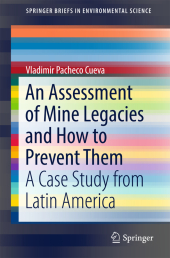 Neuerscheinungen 2017Stand: 2020-02-01 |
Schnellsuche
ISBN/Stichwort/Autor
|
Herderstraße 10
10625 Berlin
Tel.: 030 315 714 16
Fax 030 315 714 14
info@buchspektrum.de |

Vladimir Pacheco Cueva
An Assessment of Mine Legacies and How to Prevent Them
A Case Study from Latin America
1st ed. 2017. 2017. xv, 61 S. 2 SW-Abb. 235 mm
Verlag/Jahr: SPRINGER, BERLIN; SPRINGER INTERNATIONAL PUBLISHING 2017
ISBN: 3-319-53975-2 (3319539752)
Neue ISBN: 978-3-319-53975-1 (9783319539751)
Preis und Lieferzeit: Bitte klicken
This book seeks to enrich the growing literature on mine legacies by examining a case study of a small abandoned mine in Latin America. Using a combination of Rapid Rural Appraisal and secondary source analysis, this study assessed some of the most damaging legacies of the San Sebastian mine in eastern El Salvador, compared the country´s mine closure legislation against world´s best practice standards and provided strategies for awareness, prevention and remediation.
The most damaging legacy to the environment is that of Acid Mine Drainage (AMD) contamination of the local river. The impact of AMD is felt well beyond the mining district and the costs of prevention and remediation were found to be significant. Apart from environmental legacies, the mine also left a number of socio-economic legacies including: limited access to non-polluted water that results in San Sebastian residents devoting a high proportion of their income in obtaining water, lost opportunities due to the cessation of mining, uncertain land tenure situation and increasing growth of ASGM activities that exacerbate already existing environmental pollution due to use of mercury. The study also found that the state´s capacity to ensure compliance with the law is very weak and that in many important respects the country´s current legal framework does not meet world´s best practice when it comes to mine closure requirements.
The findings are important because they demonstrate that the lack of closure planning can lead to private operators socializing the costs of pollution. The study also shows that the lack of state capacity may result in extractive projects becoming socio-economic liabilities in the long term.
Chapter 1. Methodology.- Chapter 2. Knowledge about Mine Legacies, International Best Practice Standards and Mine Closure Regulation in the USA and El Salvador.- Chapter 3. Social and Historical Remarks about Mining in San Sebastian and Assessment of the Mine´s Current Legal Status.- Chapter 4. Legacies of the San Sebastian Mine.- Chapter 5. Reform, Awareness, Prevention and Remediation Strategies.- Conclusion.
Vladimir Pacheco Cueva holds a Doctorate of Philosophy and has 15 years experience pursuing research and providing training, policy and consulting to the private, community, government and academic sectors with respect to governance, community development and resource sector projects in Australia, Latin America and the South Pacific.
Dr. Pacheco Cueva specializes in the design and implementation of cost-effective monitoring and evaluation programs to assess social impacts associated with resource and other large-scale economic projects. His current research interests include the improvement of structures governing the oil and gas sector in the Artic regions.


